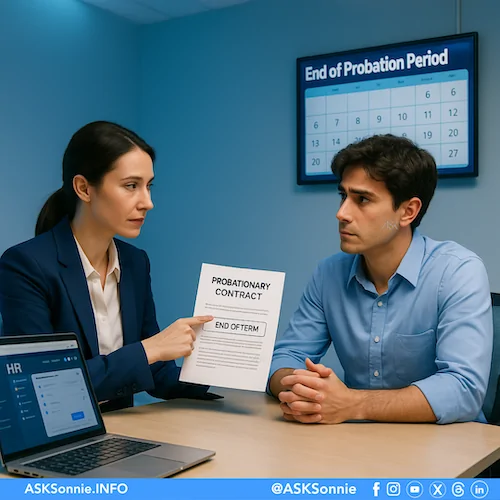Can employers end probationary employment without issuing a termination notice? In the Philippines, the answer is a qualified “yes” — but only in narrowly defined situations where a probationary contract with a definite term simply expires and the employee is not allowed to continue working.
Update Notice (2026)
This article was refreshed for relevance, accuracy, and alignment with 2026 HR and legal standards in the Philippines.
Ending Probationary Employment Without Termination Notice

Grounded on Supreme Court jurisprudence — most notably Alcira v. National Labor Relations Commission (G.R. No. 149859, June 9, 2004) — the Court held that when a valid, written probationary contract lapses and the employer does not allow further work, the employment relationship ends by expiration, not dismissal, and no separate termination notice is required.
However, this exception is narrow. In most real-world HR situations, notice, documentation, and due process remain essential. This refreshed guide breaks down legal foundations, practical scenarios, HR risks, and compliance-ready checklists backed by:
- The Labor Code (Article 296 on probationary employment)
- Leading Supreme Court decisions on probation and security of tenure
- Updated legal commentaries on regularization and documentation
Legal Basis of Probationary Employment and Contract Expiration
Probationary employment in the Philippines is governed by Article 296 (formerly 281) of the Labor Code. The general rules:
- Maximum period: six (6) months
- Exception: longer periods only for valid apprenticeship or similar programs
- Requirement: performance standards must be communicated at the time of engagement
Under the law and jurisprudence, a probationary employee may be terminated only for:
- Just cause
- Authorized cause
- Failure to qualify based on reasonable standards communicated at hiring
If an employee continues working beyond the probationary period without a new, valid basis, regularization occurs by operation of law. This was reaffirmed in Alcira v. NLRC, where the Court emphasized that security of tenure applies only during probation; once the period expires, the protection cannot be invoked unless the employer allowed continued work.
For a practical overview of probationary rules, see: NDV Law – Can Probationary Employment Go Beyond 6 Months?
Supreme Court on Ending Probation Without a Termination Notice
In Alcira v. NLRC, the employer hired a supervisor on a six-month probationary contract, then:
- Did not renew the contract
- Did not allow the employee to continue working
The employee filed for illegal dismissal. The Supreme Court ruled otherwise:
There was no dismissal — the contract simply expired.
Because the separation resulted from expiration of a definite-term probationary contract, the Court held that no separate termination letter was required in that scenario.
See case summary: Jur.ph – Alcira v. NLRC Summary
When Ending Probation Without a Termination Notice May Be Valid
This narrow exception applies only when all of the following are present:
- The employee signed a written probationary contract with a lawful, definite period (NDV Law)
- Performance standards were communicated at hiring (Alcira v. NLRC)
- The employer has documentation showing the employee did not meet the standards
- The employee was not allowed to work beyond the contract end date (Respicio & Co.)
In this scenario, employment ends by expiration, not dismissal — consistent with Alcira and updated legal commentaries.
Probationary End Scenarios: Quick Reference Table
The table below summarizes common probationary end scenarios, their likely legal effect on employment status, and recommended HR actions, so readers can quickly see when ending probationary employment without a termination notice may be defensible and when it is risky. Alcira v. NLRC; Respicio & Co. – Regularization
| Scenario at End of Probation | Legal Effect on Status | Key Employer Action |
|---|---|---|
| Standards given at hiring, clear 6‑month term, employee not renewed, no continued work | Relationship may validly end upon expiry; separate termination notice is generally not required if the contract simply lapses, but documentation of evaluation is recommended. Alcira v. NLRC; Respicio – Minimum Notice | Ensure standards and contract period are in writing; keep performance records and calendaring. NDV Law; Respicio – Minimum Notice |
| Standards given, employee continues working after probation with no new contract | Employee becomes regular by operation of law. Respicio – Regularization | Issue regularization notice; adjust benefits and records. Respicio – Regularization |
| No written standards at start, then non‑renewal at end | Termination is vulnerable to illegal dismissal claims because the legal presumption favors regularization. Respicio – Regularization | Avoid this situation; update hiring protocols. LaborLaw.ph – Probationary Contract |
| Probation “extended” orally or by unilateral memo | Undocumented extension is generally a legal nullity; employee may already be regular. NDV Law; Respicio – Regularization | Use written, justified agreements only in narrow, lawful cases. NDV Law |
| Short or rotating fixed‑term contracts used to avoid security of tenure | Courts tend to treat the employee as regular despite the paper design. Respicio – Regularization | Stop using anti‑tenure schemes; align contracts with actual work pattern. Respicio – Regularization |
Scenarios Where Notice and Due Process Are Crucial
Written notice and procedural due process remain essential when:
- Terminating mid-probation for just or authorized cause (Respicio – Minimum Notice)
- Standards were unclear or documentation is weak
- Employer actions may appear arbitrary or inconsistent
Court rulings generally resolve doubts in favor of employees, especially when documentation is lacking.
Regularization by Operation of Law and Common HR Mistakes
Regularization occurs automatically when an employee continues working beyond probation without a valid extension or updated contract. Common HR missteps include:
- Not calendaring probation end dates
- Giving undocumented or “informal” extensions
- Failure to communicate performance standards at hiring
- Missing or inconsistent evaluations
Once the employee works beyond six months, regularization happens by law — regardless of contract wording. For deeper guidance, see: Respicio – Regularization
HR Documentation Checklist and Best-Practice Recommendations
Treat the “no termination notice upon expiry” rule as the exception, not the default. Strengthen compliance with the following:
- Written probationary contract with a definite period and clear standards (LaborLaw.ph)
- Signed job description + orientation notes proving standards were communicated
- Mid-probation and end-of-probation evaluations (Respicio – Minimum Notice)
- Calendared reminders for probation end date and issuance of final notice or regularization
- Secure storage of records, emails, and evaluation forms
A documentation-first approach reduces disputes and protects both employee rights and employer prerogative.
ASK Takeaway — Applying the ASK Framework to Probationary Employment Decisions:
- Align policies, contracts, and performance standards with Philippine labor law and updated jurisprudence such as Alcira v. NLRC.
- Strengthen documentation practices — from onboarding standards to mid-probation reviews — to avoid unintended regularization and disputes.
- Kickstart a fair, transparent evaluation culture where expectations are clear, calendars are followed, and contract expiries are handled consistently.
Explore more leadership and HR insights at our cornerstone page:
ASK Framework: Align • Strengthen • Kickstart
Frequently Asked Questions
Is a termination letter required when ending probationary employment?
Not always. When a valid probationary contract with a definite period simply expires and the employer does not allow continued work, the Supreme Court in Alcira v. NLRC held that no separate termination notice is required because there is no dismissal—only expiration of contract. However, this applies only when standards were communicated and documentation supports non-renewal. See: Alcira v. NLRC.
What happens if the employee continues working after the 6th month?
The employee becomes a regular employee by operation of law. Continued service beyond the probationary cap, without a valid new arrangement, is treated as regularization. See: Respicio & Co. – Regularization.
Can employers end probation early without notice?
If termination is due to just cause or authorized cause, employers must observe the two-notice rule and due process. The “no notice” rule applies only to pure contract expiry—not to performance-based dismissal or disciplinary cases. See: Minimum Notice for Probationary Employees.
What if the employer did not provide performance standards at hiring?
Non-renewal becomes legally risky. Courts generally favor the employee and may treat the probationary appointment as regular due to lack of communicated standards. See: LaborLaw.ph – Probationary Standards.
Is extending probation allowed?
Only in narrow, documented, and lawful cases such as apprenticeship arrangements. Otherwise, “extensions” without valid written basis are often treated as legal nullities, and the employee may already be regular. See: NDV Law – Extension of Probation.
What is the safest HR practice when ending probation?
Even when contract expiry applies, best practice is to provide clear communication, complete evaluation records, and a documented non-renewal note. This reduces disputes and reinforces fairness.





